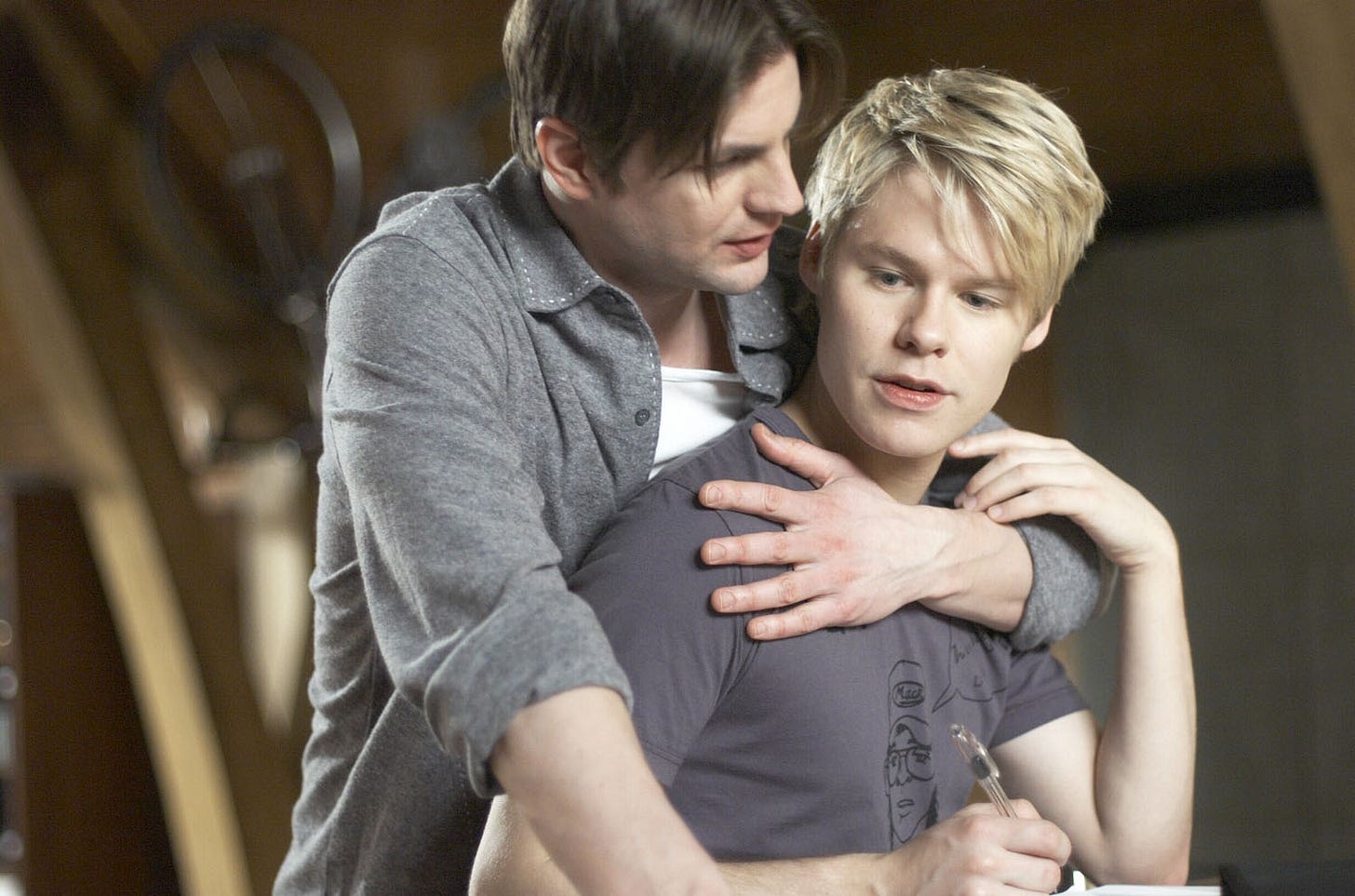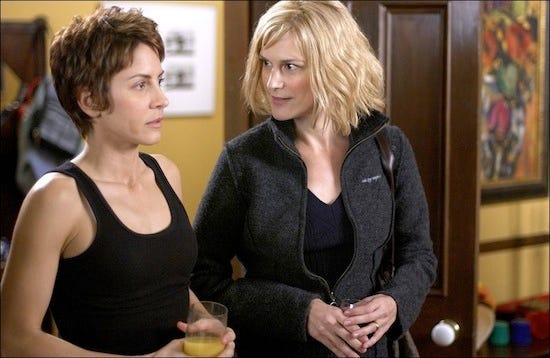queer as folk
TV, 2000, 4 stars
Creator: Ron Cowen, David Lipman (UK Series created by Russell T Davies)
First Run: 2000-2005
The hoopla surrounding the final episodes of some shows can be nothing short of extraordinary. Queer as Folk is another show that has now long finished its first airing, but unlike a lot of less worthy shows, its passing went practically unnoticed. Seinfeld gave the world some meaningless icons and a few catchphrases and it ruled network TV for years. QAF gave a face and a voice to an entire community. Sometimes the priorities of our society are totally screwed.
Although this show started as a US remake of a British TV show, it very quickly came into its own and took the concept far further than the Brits ever conceived of. (Sorry to everyone who has emailed me in horror - that's my opinion and I'm sticking to it!) QAF was groundbreaking, the show that dared when other shows were all still conservative. QAF was never afraid to say the word "fucking", and it was certainly never scared to show it either, whether it was gay men or lesbians, or simply someone jerking off. Sex was never vague or obscured, it was put right out there for people to deal with.
In five seasons QAF tackled issues as varied as drug abuse and rehab, gay bashing, safe sex, religious tolerance, BDSM, HIV adults and teens, child abuse, pornography, foster parenthood, single parenthood, trans-issues, gay marriage, immigration issues, custody disputes, gays on TV, political corruption, PFLAG, plastic surgery, testicular cancer... you name it, QAF had it. In between there were laughs, memorable characters, great music, and a lot of sex.
The lesbian contingent on QAF always played a secondary role, but that was the way the show was designed. It was a show about a group of gay men and the people involved in their lives. As the seasons went on Melanie and Lindsay, QAF's regular lesbian couple, scored bigger storylines. They went through lesbian bed death, a gay wedding (and the associated family issues), Mel's affair, Lindsay sleeping with a man and regretting it bitterly, an acrimonious separation and custody battle, followed by an eventual happy ending and a move to Canada.
Sure, moving out of the US was defeatist, but it wasn't that unrealistic. That final-episode glich aside, as a lesbian couple Melanie and Lindsay came further than any other lesbian couple have been allowed to on television before. They evolved and changed together. Look at that in contrast to The L Word, Showtime's other gay show, where it eventually became obvious that creator Ilene Chaiken saw no good drama in long-term relationships, so couples formed and broke up with alarming speed.
Here our lesbian couple were allowed to not only have their ups and downs, but were presented in juxtaposition with the uncommitted, single gay lifestyle (of both gay men and lesbians) in an interesting exploration of both sides of the issue. There are still many people in our community who believe settling down into "traditional" family units means selling out, while others believe that creating families of our own is a basic human right. It was refreshing to see QAF directly address that debate.
What started out as a sudsy drama show did get more overtly political, but never got in the way of a ripping good story, and I think that reflects the nature of the times in which the show was made. While I still believe that no television show or film should bear the responsibility of representing ALL gays and lesbians, QAF did a pretty good job of presenting issues that many of us face. I think they incorporated the politics within the storylines rather than bashing us too much over the head. OK, yes, they occasionally brought the clubs out, but only when it was for our own good, such as Brian's repeated emphasis on safe sex.
Of course, there's nothing realistic about this Pittsburgh gay mecca and its legions of beautiful (white) boys, just as the LA lesbians on The L Word are not terribly representative of reality. But that's just the flip side of entertainment: we want a reflection of our lives and issues, but don't we also want to ogle hot actors? Television is ultimately a representation of our fantasies, of how many of us wish our lives could be. Though I do think most of us would prefer a bit more ethnic variety in our hot actors from time to time.
An interesting thing about QAF is that it demonstrated the have and have not concept of beauty very well, simply through the character of Brian Kinney. The other characters worshipped and adored him as we might worship or adore a movie star, and then the object of worship is brought crashing to the ground as if to say "see, beautiful people have problems too". The fight for gay rights transcends youth and beauty, but on an everyday level people probably think about what their hair looks like more than they worry about gay rights legislation. It's the way life is, and the writers of QAF had the balance right.
Lesbian viewers certainly wanted more varied lesbian content, but we had a show called The L Word that focussed on dykes the way that QAF concentrated on boys. The QAF writers certainly gave us more lip service as part of the gay male community than The L Word gives to the presence of gay men. If the lesbians didn't have quite as much screen time as I would have liked, I found that the guys' stories were not that far removed from my own. It's a nice life lesson in how the other half live that we should all take from time to time to remind ourselves that our GLBT community has more in common than not.
The bomb blast that rocked the QAF world was a shocking metaphor for what is going on all around the world right now. The world we know is changing. Forget terrorists from other countries, they aren't the real threat. The threat has always been the intolerance we face right where we live, wherever that may be. Homophobia breeds anger and violence on both sides. From the first season where we saw Justin almost beaten to death, the QAF writers have emphasised one very important thing: queers bleed the same blood, and feel the same pain, as everyone else.
Everyone involved in QAF—from Russell T Davis who created and wrote the original British version, to the American co-creators, to the writers, to Showtime and the actors (both gay and straight) who put their faces to this material—should be enormously proud of what they've created here.
There are episodes of QAF (the third season finale especially) that literally reduce me to tears every time I watch them. Sometimes they're tears of joy, and sometimes of sadness. I just never thought I would see anything like this on TV in my lifetime, which just goes to show that every now and then TV land can still surprise you.




